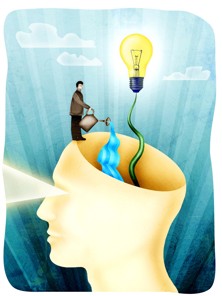By Consumer Reports
 You go into the kitchen to get something, only to forget what it was once you get there. You misplace your reading glasses, can’t find your car in a parking lot or draw a blank when trying to remember a friend’s name. It’s normal to have occasional episodes of minor forgetfulness. But “some types of memory loss are more substantial than others as we age,” says Arthur Kramer, a professor of psychology and neuroscience at the University of Illinois at Urbana-Champaign. “One aspect of memory relates different pieces of information and puts them all together, and that’s the type that isn’t quite what it used to be.” But the brain is surprisingly adept at compensating for aging, and other types of memory can improve or remain intact over time. Even more encouraging is that a set of relatively simple and inexpensive lifestyle changes can go a long way toward maintaining a vigorous mind.
You go into the kitchen to get something, only to forget what it was once you get there. You misplace your reading glasses, can’t find your car in a parking lot or draw a blank when trying to remember a friend’s name. It’s normal to have occasional episodes of minor forgetfulness. But “some types of memory loss are more substantial than others as we age,” says Arthur Kramer, a professor of psychology and neuroscience at the University of Illinois at Urbana-Champaign. “One aspect of memory relates different pieces of information and puts them all together, and that’s the type that isn’t quite what it used to be.” But the brain is surprisingly adept at compensating for aging, and other types of memory can improve or remain intact over time. Even more encouraging is that a set of relatively simple and inexpensive lifestyle changes can go a long way toward maintaining a vigorous mind.
Take a Walk
In late adulthood, the hippocampus, which is the brain region responsible for forming some types of memories, shrinks 1 to 2 percent annually, leading to memory problems and an increased risk for dementia. But regular aerobic exercise encourages the growth of new brain cells there, even if the workouts aren’t strenuous. Aim for at least 30 minutes a day, five days a week, of moderate-intensity aerobic exercise, such as brisk walking or biking.
Lead an Active Social Life
Social butterflies are more likely to retain their brain vitality. A 2011 study in the Journal of the International Neuropsychological Society followed 1,138 older people who were initially free of dementia. Researchers assessed their cognitive function and social interaction every year, recording how often they went to restaurants and sporting events, played bingo, did volunteer work, took short trips, visited relatives or friends, participated in social groups and attended religious services. Over an average of five years, the rate of decline on a broad range of cognitive abilities, including several types of memory, was 70 percent lower in the most socially active people compared with the least socially active.
Play Mind Games
Activities that challenge the mind can help keep it sharp by stimulating brain cells and the connections between them. Studies indicate that participation in a variety of activities — such as joining a book club, seeing a play, listening to presidential debates, attending lectures and playing board or card games — helps preserve acumen. Any engaging pastime counts, including needlepoint, gardening, playing the piano, studying a language, bird-watching or memorizing dance steps — and the more, the better.
Eat Food for Thought
Regular consumption of fish, fruit and vegetables might protect mental agility. Researchers from the University of Pittsburgh tracked the diets and, using MRIs, the brain volume of 260 older people with normal cognitive function in a study presented at the Radiological Society of North America last November. After 10 years, those who ate baked or broiled fish at least once a week had larger and healthier cells in brain areas responsible for memory and learning than did those who ate fish less often.
Control Blood Pressure
Chronic diseases that damage the arteries, thereby disrupting blood flow to the brain, might also injure the mind. That’s another reason to treat high cholesterol, hypertension and Type 2 diabetes and to lose weight, if needed.
Get Some Sleep
We need sleep to create memories, think clearly and react quickly; insufficient shut-eye hampers our ability to remember and reason. To combat sleeplessness, keep your bedroom cool and dark, avoid alcohol, caffeine and smoking, don’t exercise in the evening and turn off the television and all technology a few hours before you go to bed.
Reduce Stress
Stress prompts the release of hormones that can weaken memory and even damage brain cells. Just 12 minutes of daily yoga for two months improved cognition among people with memory disorders in a 2010 study in the Journal of Alzheimer’s Disease. Other stress relievers include aerobic exercise, listening to mellow music, meditating or praying, and writing in a journal.
Stop Smoking
Smoking increases the odds of memory loss in later life, but quitting at any age can halt the decline, evidence suggests. In an April 2011 study in the journal NeuroImage, researchers recruited older adults who were smokers and people who had never smoked, and invited the smokers to join a 12-week cessation program. Two years later, the rate of cognitive decline for successful quitters was similar to that of participants who never smoked, but those who were unable to quit declined more than those in either group.
Limit Alcohol
One drink a day for women and two for men is associated with reductions in cognitive decline and the risk of dementia. But heavy drinking can diminish memory by changing chemicals in the brain and causing deficiencies in Vitamin B1 (thiamin). And several studies report greater brain shrinkage among alcoholics.



